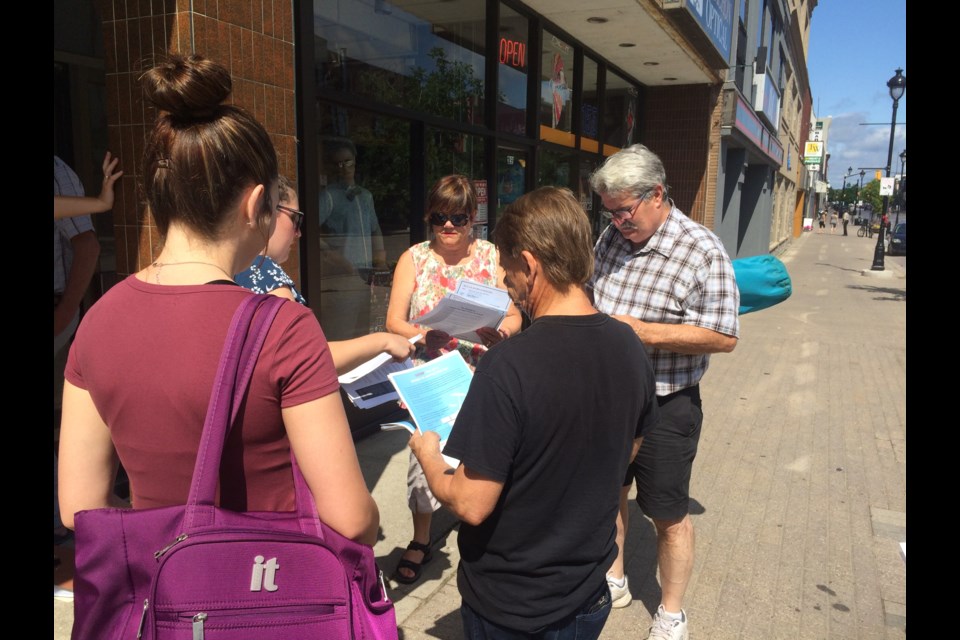The Nipissing Community Legal Aid clinic wants Nipissing MPP Vic Fedeli to convince his government to reverse cuts to Ontario community legal clinics.
A small group gathered outside Fedeli’s constituency office in support of the Legal Clinics Day of Action.
“My concern is the current cuts to the legal clinic system are hurting low-income of Ontario,” said Stuart Bailey, Lawyer director of the Nipissing Community Legal Clinic.
“We have been lucky to escape most of the cuts, but the Ford government’s cuts have cut off the head, the brain if you will, of legal clinics in Ontario, in that the people who do our advocacy for law reform, who do our heavy-duty research for things like special diet, those clinics have been cut by 20 or 30 per cent. That is making it difficult for legal clinics to exist in the system.”
The clinics work to ensure that low-income people can meet their basic needs, by providing services to assist with a variety of issues including “housing, income security, education, health care, disability programs, worker’s rights, victim’s assistance and environmental issues.”
“We budget conservatively,” said Bailey.
“We try to ensure that we’re not going to overspend, and they’ve taken away our surpluses, so now we don’t have any margin for error if we should go over.”
Bailey said no employees are losing their jobs in North Bay, and while that is generally the case across northern Ontario, it is not the case in southern Ontario.
“I’m out here because I’m part of a larger system, and that larger system has been impacted. I’m out here because I have friends who are dedicated, intelligent and spent their lifetimes working in support of low-income people and making their lives better, and those people are having their budgets cut,” explained Bailey.
” So, it is like survivors’ guilt. I haven’t been injured in the battle, but my friends have and I’m part of something bigger.”
Bailey said they were told when this first started that no jobs would be lost.
“I think that is a bit ingenious in logic because if you cut payments to a transfer payment that employs people, sure people are going to lose their jobs. The government didn’t do it directly but did it indirectly. And I’m asking Fedeli that he reverse those cuts, that his government do so.”
Caitlin Dobratz is a board member with the Nipissing Community Legal Clinic.
“The fear is over the next couple of years that the cuts are going to continue to get worse and worse which can really impact what we’re trying to do locally. So, while we’re okay right now, the future is really uncertain, what it would look like in an already small community with fewer resources, “said Dobratz who gave examples of how cuts could affect clients.
“It could definitely affect their ability to stay housed, to access legal services, legal aid certificates, and having the ability to access services in a timely manner, disability allowances, the money people rely on to survive could be a lot more difficult to access. And how people advocate for them when trying to navigate accessing these services could be impacted as well.”
Jim Klein was a board member when the clinic started over 30 years ago.
With a background in law, he sees the value of legal clinics.
“I’m a big supporter of legal clinics. Legal clinics are a very cost-effective way to deliver legal services to very hard to reach communities. Mostly impoverished people. I have a concern that when the government singles out legal clinics to save money on their budget, what they’re really doing is they’re picking indirectly on the weakest members of our society,” said Klein.
In a release, the Nipissing MPP who is currently out of the country on government business is quoted as saying;
“The fact is two-thirds of legal clinics will receive a larger funding allocation this year than they spent last year, including in Nipissing, based on quarterly reports submitted by clinics.”
The release also referred to the Auditor General’s 2018 Annual Report which stated that in recent years additional money has been spent without achieving the results that legal aid clients or taxpayers should expect.
“Legal Aid will have a budget of more than $430 million dollars this year, and even more if the federal government commits to properly funding the services for which it is responsible. We continue to work with Legal Aid Ontario is conducting a comprehensive review of legal aid services to ensure low-income Ontarians are able to access effective legal aid services. While some lawyers and special-interest groups may be critical of the renewed era of accountability at Legal Aid Ontario, it is necessary to make legal aid sustainable.”



